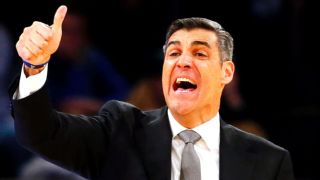|
Villanova enters Monday's national championship game as the consensus favorite over Michigan, whether your authority of choice happens to be oddsmakers, laptops or (ahem) ESPN types. All of the above expect the Wildcats to win their second national title in three years. At the risk of jumping on board an already crowded bandwagon, I would only add that Jay Wright's team is also the pick of not one but two methods that have successfully predicted and/or screened every title game winner since 2004. What are these all-seeing methods? One of them is straightforward to the point of being borderline obvious. The other one sounds more like mere superstition at first, but actually makes more sense upon further review. Here's how you could have correctly gone 14-for-14 and predicted every national title game winner from 2004 through 2017:  Method No. 1: Tournament scoring margin If you want to know who's going to win a sixth tournament game in a row, it's hardly a methodological breakthrough to examine what these teams have done over their preceding five contests. Sure enough, the team with the higher per-possession scoring margin in tournament play has won the title game 14 times in a row. This year? The numbers favor Villanova, which has outscored its tournament opponents by 0.23 points per possession. Michigan has recorded a (quite excellent in its own right) scoring margin of 0.17 points per trip. Now the caveats. Last year, North Carolina (scoring margin: 0.1645 points per possession) and Gonzaga (0.1638) entered the game on virtually and effectively identical terms. Nevertheless, the Tar Heels prevailed. Meaning, yes, take this decision rule with a grain of salt, for at least three reasons. One, if the Bulldogs had made a few more baskets on their way to last year's title game and then lost to UNC, this streak would have been snapped. Two, the streak also would have been broken in 2008, if Mario Chalmers had simply missed that shot of his at the end of regulation and Kansas had lost to Memphis. Like any streak, there's more than a little luck involved in this one's duration. Lastly, it's really hard for No. 1 seeds that make the title game to come out looking worse on this measure than opponents seeded below the No. 1 line. The top seeds get what was customarily, before UMBC, the statistical blessing of a round of 64 game against a No. 16 seed. Then again, one might expect this natural advantage in scoring margin for the No. 1 seed to be somewhat offset in this particular national championship game. You've likely heard that Michigan is yet to play an opponent seeded higher than the No. 6 line and has actually had a smoother path to the title game -- in terms of its sum of opponent seeds -- than Villanova's path. In any event, we'll see if this predictive rule holds up for a 15th year in a row. Method No. 2: The Week 6 AP poll Yes, the Week 6 AP poll, the one that comes out in early December. That sounds like an odd and possibly even random way to evaluate the teams in a game that occurs nearly four months later, right? Hold that thought. Every national champion from 2004 to 2017 was ranked no lower than No. 12 in the Week 6 poll. You would expect, of course, that this also would be true of polls done later in a season, but it's not. The Week 6 AP poll is actually the best one during the entire regular season at predicting the eventual champion. You'll notice this isn't an exclusionary either-or decision rule like method No. 1. Obviously both teams in a national championship game can be ranked in the top 12 of the Week 6 AP poll. Indeed, that has been the case in 10 of the past 14 national title games. This year, however, it is an exclusionary either-or decision rule. Villanova was No. 1 in the Week 6 AP poll in December. Michigan was nowhere to be found that week, not even in the fine print. What explains this strange predictive power in Week 6? Basically, luck and common sense. As to the former, two eventual national champions in particular -- Florida in 2005-06, and Connecticut in 2010-11 -- are driving the numbers that say Week 6 is the poll that should commend our attention. The Gators and Huskies in those seasons both went from unranked in the preseason to highly ranked by Week 6. We knew by the end of those seasons that their Week 6 ranking was more valid than the fact they were unranked in the preseason. This is where common sense comes in. By Week 6, it's plain to see which mistakes were made in the preseason rankings. Conversely, polls that come out after this point have tended to net out slightly lower on signal-to-noise ratio, perhaps mirroring and reacting to mere scheduling decisions (which teams scheduled tough games and lost them) in addition to actual team strength. Whatever the reason, the national champion has now come from the top 12 of the Week 6 AP poll for 14 years running. Villanova can extend that streak to 15. Naturally, both of these methods will be proved wrong someday, just as Syracuse proved both of them wrong in the 2003 NCAA tournament. But if you feel like riding these streaks for one more year, Villanova is definitely the pick. Good luck.
|

